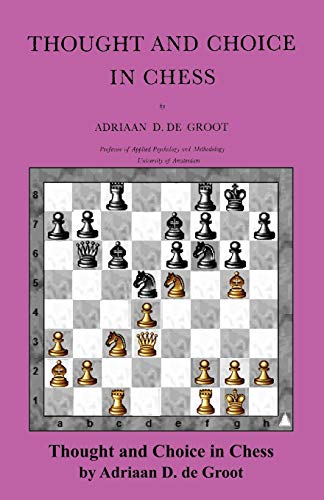Items related to Thought and Choice in Chess

What does a chess master think when he prepares his next move? How are his thoughts organized? Which methods and strategies does he use by solving his problem of choice? To answer these questions, the author did a study, to which famous chess masters participated (Alekhine, Max Euwe, Reuben Fine, Tartakower and Flohr). This book is still useful for everybody who studies cognition and artificial intelligence. The studies involve participants of all chess backgrounds, from amateurs to masters. They investigate the cognitive requirements and the thought processes involved in moving a chess piece. The participants were usually required to solve a given chess problem correctly under the supervision of an experimenter and represent their thought-processes vocally so that they could be recorded. De Groot found that much of what is important in choosing a move occurs during the first few seconds of exposure to a new position. Four stages in the task of choosing the next move were noted. The first stage was the 'orientation phase', in which the subject assessed the situation and determined a general idea of what to do next. The second stage, the 'exploration phase' was manifested by looking at some branches of the game tree. The third stage, or 'investigation phase' resulted in the subject choosing a probable best move. Finally, in the fourth stage, the 'proof phase', saw the subject confirming with him/herself that the results of the investigation were valid. De Groot concurred with Alfred Binet that visual memory and visual perception are important and that problem-solving ability is of paramount importance. Memory is particularly important, according to de Groot (1965), in that there are no 'new' moves in chess and so those from personal experience or from the experience of others can be committed to memory.
"synopsis" may belong to another edition of this title.
About the Author:
ADRIANUS DINGEMAN DE GROOT (born Oct-26-1914, died Aug-14-2006, 91 years old) Netherlands Adriaan de Groot was a Professor of Psychology and a strong amateur player. He represented the Netherlands in the Olympiads at Munich 1936, Stockholm 1937 and Buenos Aires 1939. His book Thought and Choice in Chess (translation of his 1946 dissertation Het denken van de schaker) is an important contribution to understanding how a chess master thinks. He took interest in seeing how chess computers played. Adriaan D. de Groot (1914-2006) was professor of methodology of the psychological research at the University of Amsterdam. Adrianus Dingeman (Adriaan) de Groot (Santpoort, 26 October 1914 – Schiermonnikoog, 14 August 2006) and was a Dutch chess master and psychologist, who conducted some of the most famous chess experiments of all time in the 1940s-60. In 1946 he wrote his thesis Het denken van den schaker, which in 1965 was translated into English and published as Thought and Choice in chess. De Groot played for the Netherlands in the Chess Olympiads of 1937 and 1939. In 1973 he became member of the Royal Netherlands Academy of Arts and Sciences. The studies involve participants of all chess backgrounds, from amateurs to masters. They investigate the cognitive requirements and the thought processes involved in moving a chess piece. The participants were usually required to solve a given chess problem correctly under the supervision of an experimenter and represent their thought-processes vocally so that they could be recorded. De Groot found that much of what is important in choosing a move occurs during the first few seconds of exposure to a new position. Four stages in the task of choosing the next move were noted. The first stage was the 'orientation phase', in which the subject assessed the situation and determined a general idea of what to do next. The second stage, the 'exploration phase' was manifested by looking at some branches of the game tree. The third stage, or 'investigation phase' resulted in the subject choosing a probable best move. Finally, in the fourth stage, the 'proof phase', saw the subject confirming with him/herself that the results of the investigation were valid. De Groot concurred with Alfred Binet that visual memory and visual perception are important and that problem-solving ability is of paramount importance. Memory is particularly important, according to de Groot (1965), in that there are no ‘new’ moves in chess.
"About this title" may belong to another edition of this title.
- PublisherIshi Press
- Publication date2016
- ISBN 10 4871877582
- ISBN 13 9784871877589
- BindingPaperback
- Number of pages486
- EditorBaylor George W
- Rating
Buy New
Learn more about this copy
US$ 55.36
Shipping:
US$ 12.58
From United Kingdom to U.S.A.
Top Search Results from the AbeBooks Marketplace
Thought and Choice in Chess
Seller:
Rating
Book Description Paperback. Condition: Brand New. 488 pages. 8.50x5.50x1.10 inches. In Stock. Seller Inventory # 4871877582
Buy New
US$ 55.36
Convert currency

